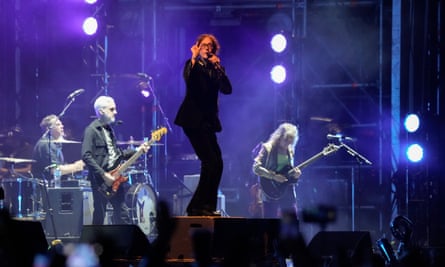Slapp Happy – Sort of
Slapp Happy’s 1972 debut album is a curious thing. It was recorded at Faust’s Wümme studios, with the krautrock legends acting as backing band, but it sounds absolutely nothing like krautrock. It was intended as a joke – a sarcastic response to experimental musician Anthony Moore’s record label demanding something more commercial – but carries no audible trace of the smug condescension that implies. Instead, it exists in an unplaceable space of its own creation. Its melodies stick with you – the fabulous Blue Flower was covered on Mazzy Star’s 1990 debut album She Hangs Brightly – its air of oddness feels unaffected, Dagmar Krause’s voice is a plaintive delight: pop music made by minds untethered to accepted notions of pop. Alexis Petridis
WAT – World According To
Just when you think there couldn’t possibly be another early 80s band at the intersection of post-punk and new wave with tinny drum machines, aloof female vocals and guitars seemingly recorded in a public toilet, it turns out there’s another – and the trio WAT, operational in Belgian city Eindhoven from 1983-1985, are a really good one. There’s something of Young Marble Giants’ Alison Statton to Ankie Keultjes’ wistful yet steely vocals, but the arrangements are way more maximalist, clearly also drawing from the jangling British indie of the time – Thin Blue Notes is like a great lost Smiths song. Their best tunes were gathered up this year on a compilation by Belgian label Stroom (who just had an underground hit with the brilliant Voice Actor). Ben Beaumont-Thomas
Germán Bringas – Tunel Hacia Tí
One of the best things about interviewing musicians from far-flung music scenes is asking them for local recommendations. After I spoke to Guatemalan cellist Mabe Fratti this autumn, I received a WhatsApp volley of enthusiastic tips from her adopted community in Mexico City – and discovered a new obsession in jazz multi-instrumentalist Germán Bringas (who also runs the club and improv cornerstone Jazzorca). Tunel Hacia Tí (tunnel towards you) is a compilation of his work from 1991 to 2000, and it spans parched spiritual vistas, lunar lounge music, squalling trumpet tantrums as dry as the desert earth, doomed kalimba hoedowns. It could live on ECM; it also variously summons visions of the intricacies of Beatrice Dillon’s music put through Oneohtrix Point Never’s warped filter. Wigged-out abstractions are followed by moments of sublime melody – I had to check that Caminatas, with its devastating, lilting, intensifying keys-and-trumpet refrain, wasn’t a cover, it sounds that classic. Everyone I’ve introduced him to has become equally obsessed: welcome to the Germán hive. Laura Snapes
Britney Spears
I wasn’t a Britney fan when she launched in 1999. Three years earlier, I’d been radicalised by the Spice Girls, and the lyrics to Born to Make You Happy offended my newly minted feminist sensibility. Recently, my return to the gym after a brief pause (2017-2023) has caused me to revisit her back catalogue. My favourite track is Stronger, which announces itself with a foghorn and only gets more demented from there, her hiccuping vocals declaring independence over a crunchy industrial beat. Where previous singles … Baby One More Timewere passive, Stronger sees her fully empowered, and I credit its energising power with at least 70% of my lifting capabilities. She’s stronger than yesterday; we both are. Joe Stone

Pulp – Death Comes to Town
In his recent memoir, So It Started There, drummer Nick Banks calls Death Comes to Town “the greatest lost Pulp track ever”. Written in their pre-fame 80s using a keyboard’s “disco” setting, the song was mysteriously abandoned during the sessions for troubled third album Separations. A remix called Death Goes to the Disco appeared on the B-side of 1991’s Countdown and the superior original eventually limped out on the album’s 2012 reissue, but it deserves a wider hearing. The hook is instantly infectious, Jarvis Cocker’s lyrics are a gateway to adventure (“Tonight’s the night, open your door and I will come inside …”) and the chorus and “la la las” are just made for giddily punching the air. Perhaps if they’d written it later, it would have been another Common People. Dave Simpson
Billy Idol – Rebel Yell
Has anyone ever displayed as much aryan beauty as Billy Idol, shirtless on the cover of Rebel Yell? Maybe Bowie. Maybe. I ask because the image has been glued to my phone all year as I’ve played and hummed along to the eerie synth and pulsating bassline of Eyes Without a Face, the album’s hit single. I first discovered it at my barber’s, where tattooed Italians inexplicably subsist on a diet of early 80s new wave and golden era hip-hop – perfect. Gloriously, I’ve also been able to share my love of Idol with friends, as the track re-emerged on TikTok this year, allowing a new generation to enjoy this chunk of new wave perfection with ethereal French backing vocals and a rap-rock middle section to boot. It’s as if Idol attempted to both condense – and pre-empt – the decade’s defining trends into one heartbreaking tale of a deteriorating relationship. Sasha Mistlin

Organic Grooves with William Parker and Hamid Drake – Black Cherry
Earlier this year, I was watching Moroccan gnawa master Majid Bekkas play. As he laid down an earthy groove on the three-string gimbri, it was his drummer Hamid Drake that caught my attention. Hitting fluid, minimal rhythms that held time often with just a single rimshot, Drake’s rooted approach to the kit was unique. He has worked with jazz luminaries including Don Cherry and Pharoah Sanders, but it was Black Cherry – a remix album of a 1997 duet with free jazz bassist William Parker by production collective Organic Grooves – that soon moved on to regular rotation in my household. Through layering dub effects, sub-frequencies and electronic beats, Black Cherry amplifies Drake’s meandering rhythms, giving them added weight for the dancefloor. Best played loud for full immersion. Ammar Kalia
Maanam
As the cliche goes; you don’t know what you’ve got until it’s gone. In July, after stumbling on a tribute marking the fifth anniversary of the death of Olga Jackowska – AKA Maanam’s Kora – I delved into the Polish band’s discography. They were mostly known for their gritty, energised, guitar-centric post-punk sound, embodied by their 1989 single Sie Ściemnia. But before that, they had softer, acoustic beginnings: from 1980, the seven-and-a-half-minute Szał Niebieskich Ciał offers crooning vocals, experimental synthesiser, edgy guitar riffs, and deeply emotional lyrics. Based on the blues scale but with a new wave flavour, it’s sad yet somehow not depressing: Kora’s warbling voice laments about the planets for the first five minutes, before a textured guitar solo takes you into a state of spaced-out wonderment. Aneesa Ahmed
Gillian Welch – Everything Is Free
I came across Everything Is Free via Father John Misty’s cover in the Spotify Studio sessions. It’s an ironic introduction for a song written and recorded by Gillian Welch in 2001, as a damning indictment of Napster and the then-emerging era of music piracy. Its lyrics leapt out at me for their ambivalence, and even anger: “Everything I’ve ever done, got to give it away … We’re going to do it anyway, even if it doesn’t pay.” Twenty years later, streaming may be legal, but artists are still not fairly compensated, and Welch’s song has emerged as a contemporary folk standard, covered by Courtney Barnett, Phoebe Bridgers and more. I love the turn in the song’s final verse, where Welch threatens her withdrawal from an exploitative system: “I don’t need to run around / I’ll just stay home … If there’s something that you want to hear, you can sing it yourself.” Elle Hunt
Ahead of Metallica’s “no repeats” double headliner duties at Download, a friend (and James Hetfield superfan) made me a playlist of songs beyond the band’s obvious classics. One of them, Creeping Death, got me stuck on their ferocious second album. Nuclear war, biblical plagues, capital punishment, suicidal depression: Ride the Lightning harnesses full-body fears to generate breathtaking power. Charged by the nightmares of literary greats (including King and Hemingway), the 80s thrash metal classic is half bravado, half total terror, and still dangerously potent. Back in June, when Metallica hammered through the album’s brutally claustrophobic title track, Ride the Lightning felt brand new. Katie Hawthorne

The Mountain Goats – Dance Music
Where to start with the Mountain Goats and their 971 albums: a concept album about goths, you say? An LP with alternative Swedish titles? I didn’t know, so I wrote them off as too tough a nut to crack. More fool me. It was this tale of fear and loathing in San Luis Obispo that finally did it. John Darnielle rap-sings his way, Subterranean Homesick Blues style, through a real-life tale of domestic abuse, childhood anxiety and the struggles with hard drugs that followed. Within it he includes a perfect encapsulation of music’s potential for escapism. As his stepfather hurls a glass at his mum and a screaming row ensues, Darnielle scurries upstairs to the safety of his record player and realises: “So this is what the volume knob’s for.” Tim Jonze


Very well presented. Every quote was awesome and thanks for sharing the content. Keep sharing and keep motivating others.